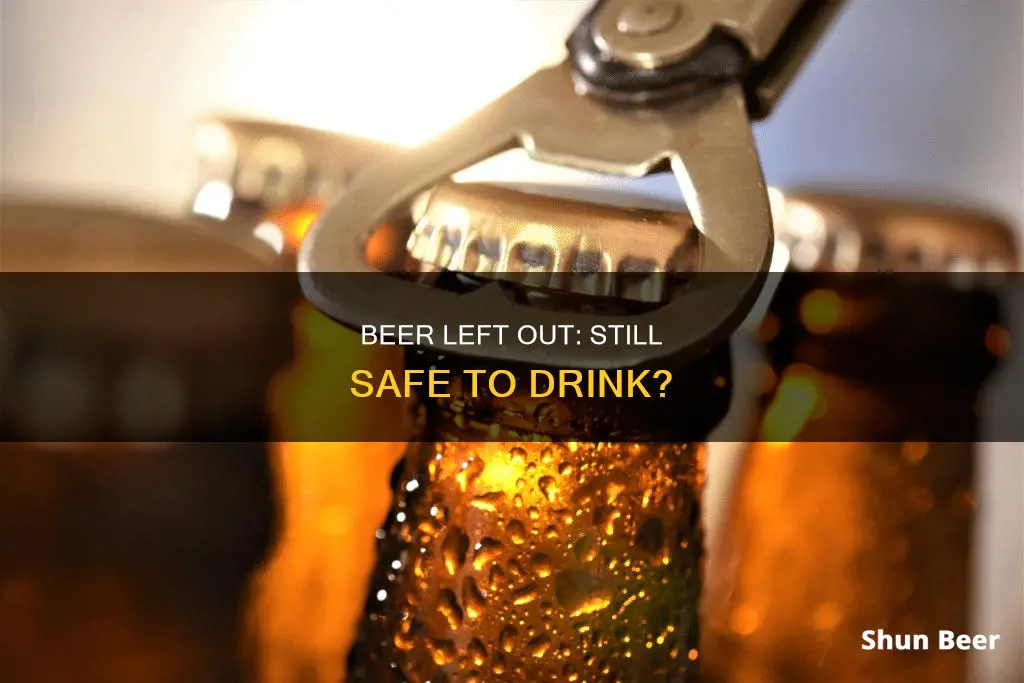
Drinking a beer that's been left out open may not be the most appealing idea, but it's something that most drinkers have likely experienced at least once. While it's generally safe to drink an open beer that's been left out overnight, it's important to consider factors such as temperature, exposure to light, and oxidation. Although it won't typically pose a health risk, the beer's taste, carbonation, and freshness will be affected, and it may even develop an unpleasant odour or strange taste.
What You'll Learn

Is it safe to drink beer left out unrefrigerated overnight?
It is generally safe to drink beer that has been left out unrefrigerated overnight. While it may not taste as good as a freshly opened bottle, drinking beer that has been left out for a short period of time will not likely pose any health risks.
However, it's important to note that beer left out in the open will start to oxidize, leading to changes in its colour, appearance, aroma, and taste. The longer it's left out, the more pronounced these changes will be. Additionally, exposure to warm temperatures will also decrease its freshness.
To maintain the optimal quality of your beer, it's best to consume it within 1-2 days of opening. Storing it in the refrigerator will also help prolong its freshness.
If you notice any signs of spoilage, such as an unpleasant taste, cloudy appearance, or strange odours, it's best to discard the beer to avoid any potential health risks.
Root Canal Recovery: Beer, Yes or No?
You may want to see also

How long does beer last at room temperature?
Beer is a unique beverage in that it does not spoil in the traditional sense. The alcohol content and hops, which have antimicrobial characteristics, prevent pathogenic bacterial growth. Therefore, drinking old beer will not make you sick, but it may not taste very good.
The shelf life of beer depends on several factors, including whether it is open or sealed, the type of beer, and how it is stored. A sealed beer stored at room temperature will last about 4 to 6 months. However, the moment you crack open that bottle, its lifespan decreases significantly. An open beer will only remain fresh for 1-2 days, after which its taste will deteriorate.
To extend the shelf life of your beer, it is best to store it in a cool, dry, and dark place, like a refrigerator or cellar, as temperature and light exposure can negatively affect its freshness. Additionally, always keep your beer bottles or cans sealed and stored upright to minimise oxygen exposure, which can cause oxidation and affect the beer's flavour and colour.
It is worth noting that different types of beer have different shelf lives. Beers with high alcohol content and malt-forward styles, such as barley wines and imperial stouts, are sometimes brewed with aging in mind and can be safely consumed after a couple of years. On the other hand, hop-heavy styles like IPAs are best consumed as fresh as possible, as the volatile aromas from hops dissipate over time, affecting the beer's flavour.
Beer and Aleve: A Safe Mix?
You may want to see also

How does temperature affect beer?
Temperature plays a pivotal role in determining a beer's shelf life. While a sealed beer can stay at optimal quality for about 4 to 6 months when stored at room temperature, an open beer is only fresh for 1-2 days. However, temperature fluctuations can negatively impact the brew's quality and taste, and extreme heat (above room temperature) will shorten its shelf life.
Ideally, beer should be stored in a refrigerator at 35°F to 46°F (2°C to 8°C). At these temperatures, the beer will stay fresh and retain its original flavour for longer. If refrigerated, an open beer will last for 24-48 hours, after which it will start to lose its carbonation, flavour, and freshness. However, it is still safe to drink and will not pose any health hazards.
When beer is exposed to higher-than-normal temperatures for an extended period, it can negatively affect its flavour. Heat does not create a specific off-flavour, but it accelerates oxidation. Oxidation can cause some beers to develop a stale, cardboard-like flavour with a hint of sherry. More malt-forward beers can develop a sweet, bready, or toffee-like flavour. The "hoppiness" of the beer will also dissipate with extreme heat, causing the piney, citrusy, or floral hop aromas to disappear.
It is important to note that cold beer can be allowed to warm up without affecting its flavour. The common misconception is that cold beer, when warmed to room temperature, will go "skunky" or bad. However, skunking is caused by light interacting with a chemical compound found in hops, not temperature fluctuations. Therefore, it is best to store beer in a cool, dark place away from direct sunlight to protect it from its "archenemy"—UV rays!
Beer and Food Poisoning: Safe Drinking After Recovery?
You may want to see also

How does exposure to light impact beer?
Light is one of the most crucial factors in determining a beer's shelf life. The sun's rays are known to shorten the shelf life of beer, as they penetrate the beverage's bottles and trigger a chemical reaction that breaks down its taste components, causing flavour deterioration. This process is known as photochemical action, a chemical change at the molecular level, and it is caused by the sun's ultraviolet (UV) rays.
UV rays are the most destructive form of light, and they are responsible for the breakdown of the chemicals in beer that give it its flavour. This is why beer is often packaged in dark bottles or cans, to protect the beverage from its "archenemy"—UV rays!
Even a small amount of exposure to UV light can cause irreversible damage to beer. This damage includes colour fading, yellowing, and embrittlement. The duration and intensity of light exposure should be carefully monitored and limited to preserve the quality of the beer.
In addition to UV rays, infrared (IR) light can also cause damage to beer through radiant heating. This process can cause cracking, lifting, and discolouration of the beer.
Therefore, it is essential to store beer in a cool, dark place to minimize the effects of light exposure and maximize its shelf life.
The Science Behind Beer: Brewing Chemistry Explained
You may want to see also

What are the signs of spoilage in beer?
Beer is a beloved beverage for many, but it can be tricky to know if it has gone bad, especially for those who are new to drinking it. Here are some signs to look out for that will tell you if your beer has spoiled:
Strange Odors and Taste
The most obvious sign of spoilage in beer is a strange or unpleasant smell. If your beer gives off a skunky, urine-like, or vinegar odour, it has gone bad and should be discarded. This odour could indicate bacterial growth or other microorganisms in the beer, which can make you sick. Even if the smell is subtle, it's best not to take the risk.
Similarly, if your beer has developed a strange taste, such as metallic, sour, or cardboard-like flavours, it has likely been contaminated or oxidised. This can happen due to exposure to oxygen or bacterial growth. If you notice any unusual flavours, it's best to pour the beer out.
Cloudiness or Haze
Cloudiness or a hazy appearance in beer can be a sign of spoilage, especially when accompanied by strange tastes or odours. This could indicate the presence of bacteria, which can cause proteins and other compounds to clump together, resulting in a cloudy appearance. However, it's important to note that not all cloudy beers are spoiled, as some craft beers may have a hazy appearance by design or due to unsettled sediment.
Mold
While it is rare for unopened beer to develop mold due to its alcohol content and low pH level, issues during the bottling or canning process can introduce mold. If you notice any mold growth on your beer, whether unopened or opened, it is best to discard it. Proper packaging and storage are crucial to prevent mold formation.
Other Visual Signs
In addition to cloudiness, there are other visual indicators of spoilage in beer. If your beer appears darker or has sediment floating in it, it has likely gone bad. Air bubbles rising to the top, leaking, or foam formation are also signs of spoilage.
Health Hazards
It is important to remember that spoiled beer can have serious health consequences. Some types of spoilage are caused by pathogenic bacteria, which can make you sick even if the beer is cooked to a safe internal temperature. Therefore, if you have any doubts about the quality of your beer, it is always better to be safe and pour it out.
Drinking Beer on Manhattan Streets: Is It Legal?
You may want to see also
Frequently asked questions
Yes, you can drink a beer that was left out open but it's not recommended as it may lose its flavour and taste.
Yes, it is safe to drink an open beer left out overnight. However, it will likely be flat and won't taste as good.
A bottled beer stored at room temperature and appropriately sealed can last up to half a year. Once opened, it is best to consume it within 1-2 days to enjoy its optimal taste and quality.
Leaving an open beer out for too long can result in oxidation, leading to changes in its colour, appearance, aroma, and taste. It may also increase the risk of bacterial growth and other microorganisms, causing spoilage.
To extend the shelf life of beer, store it in a cool, dry place, away from direct sunlight, and minimise exposure to oxygen by sealing the bottle or can tightly.







